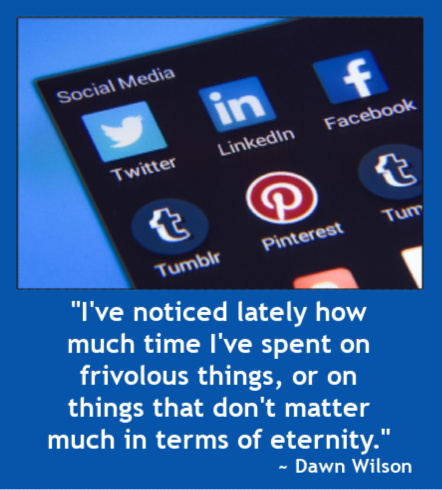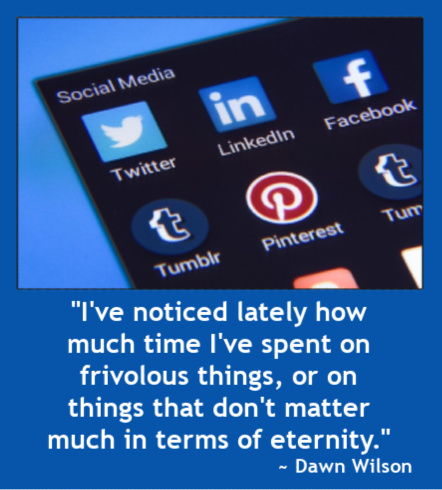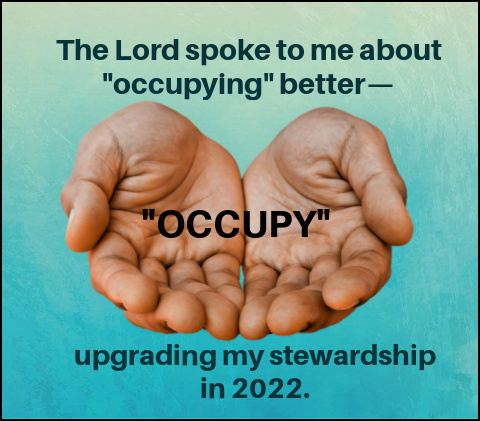Entertaining Time Thieves—Part 2
In Part 1 of “Entertaining Time Thieves,” I (Dawn) focused on the massive amount of time we waste. While we need time to relax and be creative, we also need to be more intentional with our use of time during our regular workdays.
Part 2 focuses on two more ways we can stop entertaining time thieves in the new year.
Just as a reminder, the first two points were:
1. Live with an Eternal Perspective, and
2. Choose Activities with Purpose.
These last two points are just as practical and biblical.
3. Guard Time, because It Is Precious.
William Penn once said, "Time is what we want most, but what we use worst." Time is precious. If we do not guard it, time thieves will slip in to steal not just our time, but also our productivity and effectiveness for God and His good plans for our lives.
Guarding our time means we must first determine what matters to us and, more importantly, to God. We need to ask God for wisdom (James 1:5; Proverbs 2:6), and then obey what He says to do.
In our obedience to God, we may need to say "no" to others—or even ourselves.
Before COVID-19 and before my diagnosis, I loved to go shopping. I'm not talking about buying necessities; I'm referring to wasteful shopping. I'd meander up and down aisles, looking for sales, but more often than not, I bought things I didn't need. A jam-packed clothes closet testified to that. I only wore maybe 20% of the clothes in my closet.
A good dose of rational minimalism cured me of the shopping habit, and freed up my time (and money!) for better things.
In time, I found many other areas that stole my time.
Each of us likely needs to say "no" to unnecessary things so we can say "yes" to more things that fit our calling and biblical priorities, especially the priority of spending time with our Creator and with our key relationships (Matthew 6:33; Mark 12:30-31).
As we make our plans, we need to hold them loosely, allowing God to use, re-shape, or replace them according to His will. Truly, our "times"—whatever He allows to come into our lives—are in His hands (Psalm 31:15a). Guard your time. It is precious.
4. Strive for Excellence in All Things.
One key to not wasting time is focusing on a life of excellence. This is not the same as achieving perfection, which we won't accomplish until heaven (and even then, it's all God's doing, not ours).
Excellence is a mindset and approach to life that says we want to improve and do our very best. We don't want to be slackers!
Paul encourages Christ-followers in this regard.
Whatever you do, work heartily, as for the Lord and not for men. . . whatever you do, do all to the glory of God . . . . For from him and through him and to him are all things. To him be glory forever. Amen (Colossians 3:23; 1 Corinthians 10:31b; Romans 11:36, ESV).
That sounds like a Christian life lived with excellence to me!
There are many contrasts between people who are time wasters and those who strive for excellence. Here are just three contrasts.
(1) Time wasters are content to get by with less than their best so they'll have more time for endless, worthless pursuits.
Those who strive for excellence desire to discover and do all the things God has planned for them to do (Ephesians 2:10).
(2) Time wasters forget they are accountable to God for how they use time—whether it is used with excellence or with mediocrity.
Those who strive for excellence become more and more conscious that focused use of time matters, especially as we move toward the Lord's return (Ecclesiastes 3:1-8; Mark 13:33).
(3) Time wasters forget they only have a little while to obey God.
Those who strive for excellence know they must work for "the night is coming" when we will no longer serve God on earth (John 9:4). So they are more and more driven to share the gospel, build His Kingdom, and cooperate with the Holy Spirit in becoming more like Jesus.
Is it foolish to focus on wise use of time? Not at all.
The Bible tells us we will receive rewards or "crowns" for our lives of service and sacrifice for Christ. One crown in particular stood out to me as I meditated on the subject of time.
The Crown of Righteousness (2 Timothy 4:8) is for those who long for heaven—for Jesus' return. If we long for heaven, we will want to use our time wisely to please God, because we know we'll see Him soon!
The apostle Paul understood this. He rightly admonishes us in Ephesians 5:15-17 to redeem time:
Be very careful, then, how you live—not as unwise but as wise, making the most of every opportunity ... do not be foolish, but understand what the Lord's will is.
Does this focus on time feel like a huge GUILT TRIP to you? Remember, there is no condemnation in Christ (Romans 8:1).
But God wants us to grow in our understanding of how to wisely use our time.
(I said in Part 1 that I recognize I'm failing in this area. I've confessed it as sin. I am going to do better as God helps me. A good place to start is a forward-looking strategy for social media use.)
In this new year, my point is this: We ALL can pray for discernment and make better use of our time.
Are you guarding your time and striving for excellence? If not, how can you reclaim your time and invest it for the Lord and His glory? What changes could you make this week to "redeem the time"?
Dawn Wilson, founder and President of Heart Choices Today, is a speaker and author,  and the creator the blog, Upgrade with Dawn. She is a contracted researcher/reviewer for women's teacher and revivalist, Nancy DeMoss Wolgemuth at Revive Our Hearts, and is a regular columnist at Crosswalk.com. She and her husband Bob live in sunny Southern California, and Dawn has traveled with Him in Pacesetter Global Outreach. They have two grown, married sons, three granddaughters and a rascally maltipoo, Roscoe.
and the creator the blog, Upgrade with Dawn. She is a contracted researcher/reviewer for women's teacher and revivalist, Nancy DeMoss Wolgemuth at Revive Our Hearts, and is a regular columnist at Crosswalk.com. She and her husband Bob live in sunny Southern California, and Dawn has traveled with Him in Pacesetter Global Outreach. They have two grown, married sons, three granddaughters and a rascally maltipoo, Roscoe.
Graphics adapted, courtesy of PhotoMix-Company and Foto-Retusz at Pixabay.
 Post a Comment → Posted on
Post a Comment → Posted on  Thursday, March 21, 2024 at 2:00PM
Thursday, March 21, 2024 at 2:00PM  Accountability,
Accountability,  Dawn Wilson,
Dawn Wilson,  Redeem the Time,
Redeem the Time,  Time,
Time,  Time Management,
Time Management,  Time Thieves,
Time Thieves,  Time Wasters,
Time Wasters,  Upgrade with Dawn,
Upgrade with Dawn,  Use of time,
Use of time,  Wasting Time Upgrade Your Life
Wasting Time Upgrade Your Life  Time Management
Time Management 








